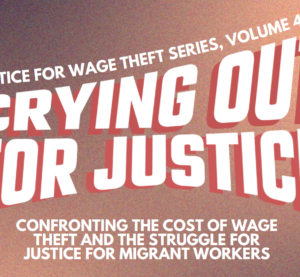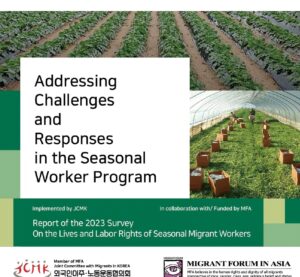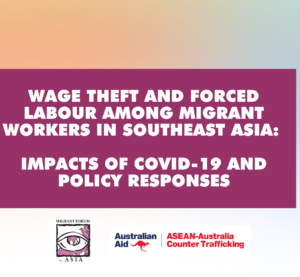Domestic Worker Convention: More Chance of Change in the Middle East?
— February 2, 2011By John Gee
Published in Washington Report on Middle East Affairs, January/February 2011
In June 2011, the International Labor Conference (ILC) will decide whether to adopt or reject a convention on standards concerning decent work for domestic workers, commonly called “maids.” Domestic workers’ organizations and advocacy groups hope that this could be a landmark in a global effort to secure respect for their rights. The initiative has gained considerable support from states worldwide, except in Asia, where views have been more divided.
Over 100 million people worldwide work in domestic service: like all figures for employment in the informal sector, this is necessarily imprecise. The overwhelming majority of these workers are women. Discussion of domestic workers’ rights concentrates heavily on those who have gone abroad to work and who are, with reason, seen as particularly vulnerable to abusive treatment. Many, however, have gone into service within their own countries, including some 20 million in China, 5 million in India, more than 2.5 million in Indonesia and 1.2 million in South Africa, where it is the biggest single sector of women’s employment. Being employed in their own countries does not necessarily ensure good treatment: long hours, low pay and unreasonable treatment that would not be seen as acceptable in any other labor sector are the norm for domestic workers in the majority of states.
About six million female domestic workers are employed in the Middle East. The great majority are from outside the region, particularly the Philippines, Indonesia, Sri Lanka and Bangladesh. While there is an especially high level of dependence upon them in the oil-rich states of the Gulf, they can be found anywhere there are wealthy people: there are even a few Filipinas who work for middle-class Palestinians in the Gaza Strip and West Bank. As in much of the rest of the world, standards applied to other people are often waived when it comes to domestic workers. In intensely conservative Arab countries where the mixing of unrelated men and women is forbidden and severely punished, the employment of foreign female domestic workers within family homes is socially and legally accepted.
Those who find good employers tend to be paid better than they would be in much of the world and have no complaints about their treatment, but many are not so fortunate. Complaints of abuse abound. In 2008, Human Rights Watch noted that on average in Lebanon, one domestic worker a week died by killing herself or while attempting to escape from tall buildings, where their employers often lock them in. Local human rights campaigners have since tried to win support for all domestic workers to have a regular day off, when they will be free to go out. It might be noted that, among domestic workers, Lebanon is not seen as one of the worst destinations in the region.
Calls for reform have gathered more support in recent years. In all of the Gulf countries, there are individuals and bodies that have spoken up strongly against abusive treatment of domestic workers and the readiness of law enforcers to let abusers off lightly—and sometimes even to make a worker who seeks justice into the guilty party. In the Gulf, when a domestic worker lodges a complaint against a family, they often respond by accusing her of serious offenses such as attempting to seduce men of the family, if she says she was raped, or practicing witchcraft, in other circumstances. This makes workers afraid to seek help or to complain to the authorities.
Some steps are being introduced to improve the status of domestic workers. Among the Arab countries, Jordan went furthest when it brought migrant domestic workers under the coverage of its labor law in 2008. In most Gulf countries, workers come under a sponsorship system, which ties them to a specific employer who can prevent them from seeking another employer, deport them at will, or withhold permission for them to leave the country. Bahrain abolished this system in 2009.
To comply with the provisions of the proposed domestic workers convention would require much more radical change and their enforcement would be a challenge, given widespread employer support for the status quo and opposition to what would be seen as intrusion into families’ private affairs, as a Saudi participant in the ILC pointed out.
There was something of a trial run for the 2011 ILC vote at the 2010 conference, when a draft International Labor Organization instrument on decent work for domestic workers was discussed. A vote was taken on whether the instrument should be in the form of recommendations, which would simply advise states as to appropriate standards, or of a convention plus recommendations, which would oblige signatory states to bring their laws into compliance with the convention’s terms.
Not surprisingly, employers’ organizations supported recommendations only, while workers’ organizations supported a convention plus recommendations. Each commands a quarter of the ILC votes; states hold half. States in the Americas, Africa and Europe were almost entirely in favor of a convention, but Asian countries were fairly evenly divided. The supporters of recommendations only were Bahrain, Bangladesh, India, Indonesia, Iran, Kuwait, Malaysia, New Zealand, Oman, Panama, Qatar, Saudi Arabia, Singapore and the United Arab Emirates. Lebanon, Syria and Turkey supported a convention; Israel abstained. Representatives of most other Arab states besides those mentioned above did not respond when called upon to vote.
Most states that voted for recommendations only are likely to vote against adopting a convention in June 2011, but human rights advocates hope that the pro-convention majority will gain some additional support. If a convention is adopted, it will still need a long process of ratification by states before it comes into force, but its very existence will establish a set of standards against which states’ handling of domestic worker issues may be measured in the future.
Obama in Indonesia
Barack Obama made his long-awaited visit to the Indonesian capital of Jakarta on Nov. 9 and 10, during a 10-day swing through Asian countries coordinated around the G-20 summit in South Korea. It was not the kind of “meet the people, see childhood sights” visit that Jakarta residents had hoped for, but a tightly organized series of official engagements crammed into less than 24 hours. Nevertheless, Obama generally received a warm reception and made a good impression.
His packed agenda included meeting President Susilo Bambang Yudhyono and attending a state dinner given by him. One of the guests was ex-President Megawati Sukarnoputri, who has boycotted events at the palace since losing office in 2004, but turned up to meet the Obamas. Obama also made a keynote address at the University of Indonesia and visited the Istiqlal Mosque. The university speech was billed as being addressed to the wider Muslim world and a follow up to the speech he made at Cairo University shortly after being elected president.
During a press conference at the presidential palace, Obama said, “What we are trying to do is to make sure that we’re building bridges and expanding interactions with Muslim countries so that they are not solely focused on security issues.








